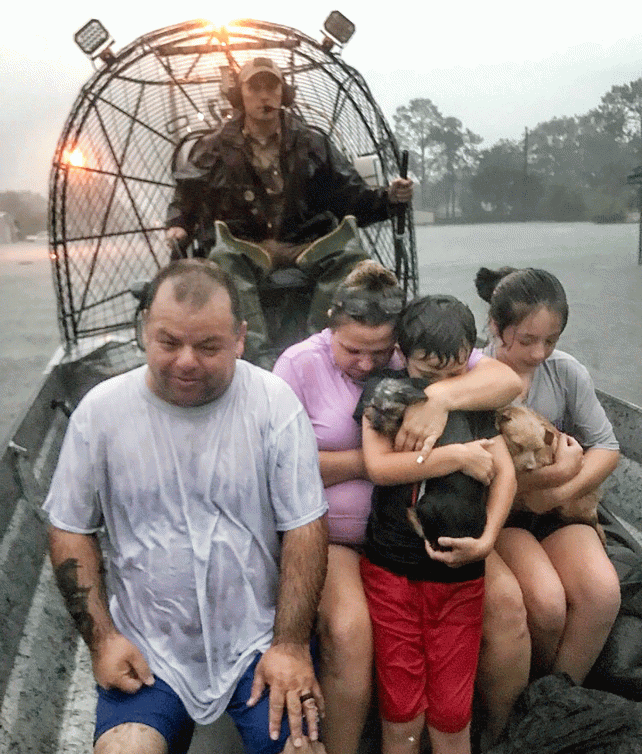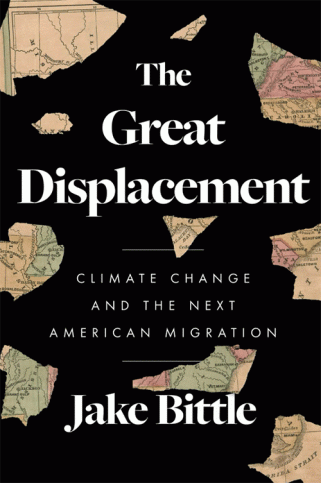How Climate Change Plagues Ordinary Americans

A state employee rescues a family from flooding during 2019’s Tropical Depression Imelda near Beaumont, Texas.
Texas Parks & Wildlife Department via AP
This story was originally published by Undark and is reproduced here as part of the Climate Desk collaboration.
What goes through a person’s mind when disaster strikes? In Jake Bittle’s The Great Displacement: Climate Change and the Next American Migration, an ambitious book that details the radical transformations climate change is wreaking on American life, we are given a glimpse.

We stand with Patrick Garvey and Jen DeMaria as they marvel at the tranquil eye of the storm that decimates their community in the Florida Keys, and see through their eyes the dream-like destruction of flipped sailboats, uprooted trees, and unrecognizable streets. We drive in the Tran family’s car as they rush past the cul-de-sacs of their California neighborhood while a wildfire bears down on them, and then return the next day with the help of Google Maps to identify the charred, empty lot that had been their home.
As Bittle, a staff writer at Grist who covers climate impacts and adaptation, writes of the son, Kevin Tran: “His mind kept coming back to the same question that was consuming all the climate refugees around him. Where were they all going to go?”
The book’s title is an oblique nod to the Great Migration, a wave of some 6 million Black Americans who moved out of the South to escape Jim Crow laws and seek economic opportunity in places like Chicago, Los Angeles, and New York during the first two-thirds of the 20th century. The displacement that Bittle predicts will envelop America in the 21st century, however, promises to far eclipse that profound relocation and create what he describes as a “generation of domestic climate migrants.”
Bittle reports that at least 20 million Americans will be forced to move by the end of this century due to climate change. One of the successes of “The Great Displacement” is that the book transcends the abstraction and hyperbole of such mind-boggling numbers, thanks to Bittle’s unflinching reporting. In the stories he has collected, we are able to see human nature unveiled to a raw and essential state.
In moments of danger, everything from fear, optimism, doom, hope, courage, despair, obstinance, defeat, and heroism can surface. We meet people like Nancy Caywood, a cotton farmer living through a megadrought in Arizona who watches her land “stiffening like a corpse.”
We also get to know Cindy Mazzola, a divorced mother of two in Houston who loves jigsaw puzzles and had to flee her neighborhood on an inflatable raft during Tropical Storm Allison. Though Mazzola was able to use a government buyout and home equity to move her family to a less flood-prone area of the city, her neighbors were displaced to a similarly vulnerable neighborhood that within a few years was swamped by yet another storm. “The same rain had fallen on all of them,” writes Bittle, “but they lived in an unequal city, and had met unequal fates.”
Telling the story of climate change is a daunting task for journalists who must decide at what scale to report on the crisis. Do they focus on the individual, the country, political systems, ecologies, or the planet itself? For most of the book, Bittle chooses to tightly telescope on the human aspect. He interviewed hundreds of people across America who have lost homes and communities to drought, flood, hurricanes, and wildfires.
Though the portraits can begin to feel relentless toward the middle of the book, there is no mystery as to why he made this choice: Bittle’s skill as a journalist is in creating humanistic portraits of his sources through the gathering of minute and intimate details which he serves up in just a page or two. He also crafts propulsive accounts of the disasters that upended his sources’ lives.
Bittle manages to relate these dramatic stories with sensitivity, restraint, and compassion. One can’t read “The Great Displacement” and deny the insecurity and misery climate change has already wrought on American families and communities. Indeed, one of Bittle’s intentions seems to have been to convince us that even if things can get far worse if society does not divest itself of the fossil fuel economy, things are already very, very bad.
No one knows what the world will look like in 2100, of course, but Bittle argues that we will surely be living in a “new American geography.” Coastal towns will wash away, whole neighborhoods located in flood zones will empty, parched subdivisions will be abandoned, and wildfire-prone towns will burn.
According to the National Oceanic and Atmospheric Administration, global warming has likely already locked in at least 2 feet of sea-level rise by 2100. Over the same time, extreme heat will make some places inhospitable, and drought will continue to dry up water resources. These climactic trends are likely to exaggerate demographic trends already underway such as urbanization and the movement of people to mid-size inland cities like Atlanta, Orlando, and Charlotte for jobs and affordable housing.
Counterintuitively, some of the fastest-growing cities in the country are actually the most vulnerable to global warming: Phoenix, Miami, and Dallas. Part of the reason these kinds of places still attract people is because, Bittle posits, disasters are still isolated displacement events. We have yet to see the “oppressive new normal” manifest in full blown demographic shifts across the country.
When that happens, heat will likely be the culprit: By 2070, he writes, the southern edge of the moderate temperature zone will be near Kentucky, and states to the south will face increasingly dangerous heat wave and humidity. Great Lake and Rust Belt cities may very well become safe havens of a kind—places like Cincinnati, Madison, and Duluth.
Bittle is authoritative on issues like managed retreat, stranded assets, racial disparity, and toxic mortgages, connecting these concepts to the lived experience of the people he reports on. And he offers a forceful diagnosis of what has led to this moment of unprecedented instability.
The trigger is climate change, but underfunded disaster relief systems, dire affordable housing shortages, and broken insurance markets have and will worsen people’s pain. As Bittle writes, “climate change is applying stress to an already brittle social and economic order, widening cracks that have been there the whole time.” Importantly, Bittle emphasizes how the effects will be felt by those with the fewest resources to weather them.
If there is a weakness in The Great Displacement, it arguably comes in the last chapter, which seems to have been reserved for grand policy prescriptions that might have been better absorbed if they had been interwoven throughout the book. Yet, even then, it is hard to disagree with the prescriptions themselves, which Bittle boils down to the profound and simple question: “What do we owe to each other?”
The answer, in his opinion, is a universal guarantee of shelter. He does not skirt the tremendous difficulty this would involve. Nor does he claim it will be possible to save every place. “Countless different communities, pockets of idiosyncratic subculture, repositories of surprising and cherished history, will have to be abandoned,” he writes.
As I read Bittle’s descriptions of individuals fleeing floods in Virginia and Florida, California was drowning in January’s atmospheric rivers that created storms, flooding, landslides, and sinkholes that killed at least 22 people. Thousands of people were forced to evacuate and the damages reached $5 to $7 billion in total economic losses, according to one estimate.
On the radio, homeless people related their experiences of being rescued from drowning and newspapers detailed search and rescue missions for children swept away in flash floods. Switching between reading The Great Displacement and the day’s news felt surreal: Echoes of past events that Bittle writes about were manifesting in the present, suggesting that the future mass displacement he warns of seemed to already be here.
There were other instances when even Bittle’s timely reporting was eclipsed by the chaos of today’s unpredictable weather. For instance, he writes that Buffalo, New York, might become a climate refuge in the future, something I read in the days after the deadliest snowstorm in decades caused the deaths of at least 47 people in the area.
Like so many of the disasters it covers, The Great Displacement reveals the fragility of American society. We are all, to varying degrees, Bittle concludes, “struggling to adjust to a new reality.”
